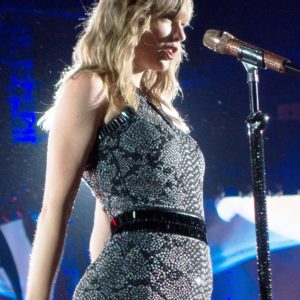The most decorated female pop star in American Music Awards history — Taylor Swift — broke her longstanding silence on politics with an Instagram post condemning GOP candidate for U.S. Senate, congresswoman Marsha Blackburn and encouraging her followers to register to vote.
Following her post, third-party voter registration site Vote.org reported an enormous spike in voter registration which the director of communications attributed directly to Swift.
Since then, dozens of publications have written fawning pieces analyzing Swift’s post and its apparent impact on the Millennial electorate, some even suggesting this renews the debate over whether celebrities should involve themselves in politics.
But there is no “debate.” American celebrities — especially musicians — have used their influence to take political positions and remark on social and cultural changes for decades.
During the Civil War, both the Confederacy and the Union co-opted folk music and hymns to support their different causes. Julia Ward Howe turned the folk tune “John Brown’s Body” into the stirring war anthem “The Battle Hymn of the Republic.” At the beginning of the 20th century, American composers like John Philip Sousa started writing explicitly American, nationalist music and marches. Today, Sousa’s popular marches are practically synonymous with American patriotism.
Fast forward to the 1960s and the birth of rock ‘n’ roll, rock bands started writing explicitly political music even if they didn’t write political statements or endorse candidates for public office. The Beatles wrote numerous songs with political overtones, like “Blackbird,” “Taxman” and “Revolution” and individually the members each wrote songs condemning various political and cultural events, like John Lennon’s “Attica State” and “Bring on the Lucie (Freeda People).”
Crosby, Stills, Nash & Young recorded the explosive “Ohio” in 1970 almost immediately after the Kent State protest and shootings, condemning the National Guard’s violence.
Irish rock band U2 is renowned for its political songs touching on events from all around the globe, like “Bloody Sunday,” “Miss Sarajevo,” “Seconds,” “Walk On,” “Bullet the Blue Sky,” and “Mothers of the Disappeared.”
In the late 90s and early 2000s, punk rock band Green Day took explicit, left-leaning political stances in many of its songs, especially in their “American Idiot” and “21st Century Breakdown” albums.
In 2003, the Dixie Chicks’ Natalie Maines told a London audience “Just so you know, we’re ashamed the President of the United States is from Texas.” That remark criticizing the president on foreign soil inspired protests from country-music fans across the U.S.
Fast forward to 2016, and R.E.M. rebuked Donald Trump for using their song “It’s the End of the World As We Know It (And I Feel Fine),” continuing the tradition of musicians taking political stances with their music.
Rapper Kanye West is a well-known Trump supporter, and is using his celebrity status to sit down with President Trump to discuss prison reform this week.
Musicians are no strangers to politics. In 2018, politicians should expect celebrities to condemn and endorse.
In fact, politicians should be wary of the influence megastars brandish. Swift is one of the best-selling music artists of all time, and she’s known for her tight relationship with her fans, which she emphasized from the very beginning of the career via MySpace interactions.
Even at the height of her career, Swift is known for “taylurking,” in which she interacts with fans on various forms of social media (especially Tumblr and Instagram) in order to emphasize a close, friendly relationship with them. She invites fans to “secret sessions” of her new albums before they are released. She gives her most dedicated fans Christmas presents, bakes them cookies, invites them to special parties and takes selfies with them.
In turn, fans aggressively defend her from any attacks on her character. They dress up in copycat costumes from past tours or outfits from music videos or costumes playing off her song lyrics when they attend Swift concerts. Speaking of her concerts, almost every one of them sells out.
Swift wields enormous influence over her fanbase, perhaps even more than the issues themselves.
Politicians should take note: popular musicians have been and always will be political, and they have the power to sway public opinion even outside their fanbases.
Maybe political candidates should start campaigning the music industry, too.

